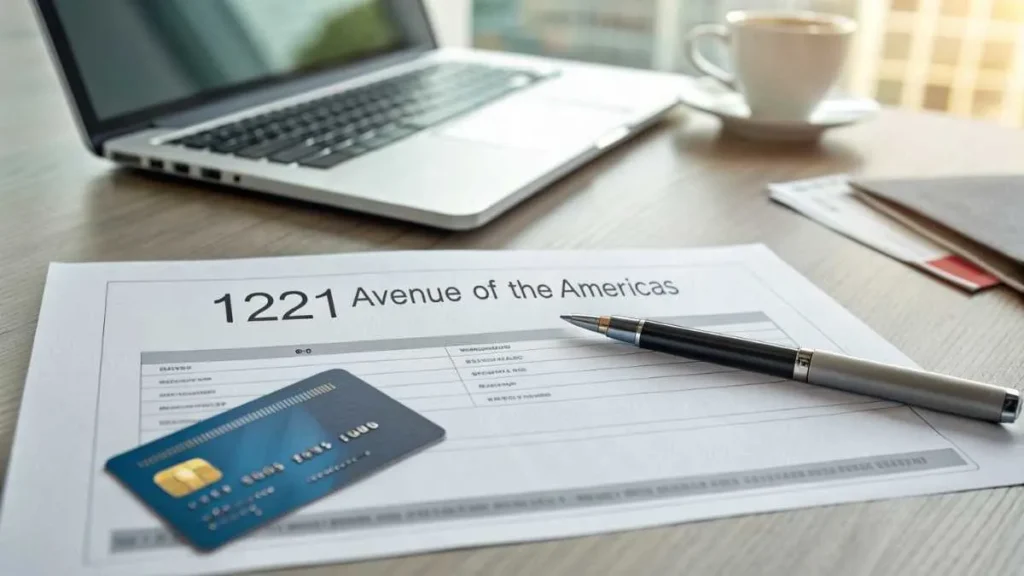
If you’ve noticed a charge labeled 1221 Avenue of the Americas on your credit card statement, you’re not alone. This address corresponds to a prominent office building in Midtown Manhattan, New York City. However, the appearance of this address on your statement doesn’t necessarily mean you made a purchase there. Understanding what this charge signifies and how to verify its legitimacy is crucial for protecting your finances.
What Is the 1221 Avenue of the Americas Credit Card Charge?
1221 Avenue of the Americas is a commercial office building located in Midtown Manhattan, New York City. It’s home to various businesses and organizations, including major corporations like Morgan Stanley, Deloitte, and SiriusXM Metro Manhattan Office Space. The building itself doesn’t conduct retail transactions; however, charges appearing with this address can stem from several sources:
- Business Services: If you engaged with a company located in the building, such as leasing office space or utilizing services, the charge might reflect that transaction.
- Third-Party Processors: Some merchants use third-party payment processors that list the building’s address as the billing descriptor.
- Unauthorized Transactions: In some cases, the charge could be fraudulent, especially if you don’t recognize the transaction.
Given the building’s role as a business hub, charges associated with it can vary widely in nature.
Common Reasons You Might See This Charge
Understanding the potential sources of this charge can help in identifying its legitimacy:
1. Payment for Office Services or Subscriptions
If you’ve engaged with a company based at 1221 Avenue of the Americas, such as a coworking space or a business service provider, the charge could correspond to a payment for their services.
2. Online or Recurring Service Fees
Some online services or subscriptions may use this address as their billing descriptor, especially if they operate out of this building. For instance, SiriusXM, a major satellite radio provider, has been associated with this address in past filings FCC Report.
3. Third-Party Payment Processors
Merchants sometimes use third-party payment processors that list the building’s address as the billing descriptor. This can make it challenging to identify the actual merchant responsible for the charge.
4. Unauthorized Use Due to Fraud
If you don’t recognize the charge and haven’t authorized any transactions related to this address, it could be a sign of fraudulent activity. In such cases, it’s essential to act promptly to protect your account.
How to Verify the 1221 Avenue of the Americas Charge
To determine whether the charge is legitimate or fraudulent, consider the following steps:
1. Review Your Recent Transactions
Reflect on any recent purchases or subscriptions that might correspond to this charge. Check your email for receipts or confirmations that could provide more context.
2. Contact the Merchant Directly
If you can identify the merchant associated with the charge, reach out to them directly for clarification. They should be able to provide details about the transaction.
3. Check Your Credit Card Statement for Merchant Contact Details
Your credit card statement may include contact information for the merchant. Use this to inquire about the charge.
4. Search Online for the Business or Service Provider
Conduct an online search for the business or service provider associated with the address. This can help confirm whether the charge is legitimate.
5. Contact Your Credit Card Issuer
If you’re unable to identify the charge, contact your credit card issuer. They can provide more information and assist in resolving the issue.
Steps If the Charge Is Unauthorized
If you’ve determined that the charge is unauthorized, take the following actions:
1. Report the Charge Immediately
Contact your credit card issuer as soon as possible to report the unauthorized charge. They can initiate an investigation and take necessary actions to protect your account.
2. Consider Requesting a Temporary Card Hold or Replacement
To prevent further unauthorized transactions, consider requesting a temporary hold on your card or a replacement card with a new number.
3. Dispute the Charge Under the Fair Credit Billing Act (FCBA)
Under the FCBA, you have the right to dispute unauthorized charges within 60 days of the statement date. Your credit card issuer is required to investigate the dispute and resolve it promptly.
4. Monitor Your Account for Further Suspicious Activity
Regularly review your credit card statements and account activity for any additional unauthorized transactions. Promptly report any suspicious activity to your issuer.
5. Provisional Credit May Be Provided
While the issuer investigates, you may receive provisional credit for the disputed amount. This ensures you’re not financially burdened during the resolution process.
Disputing a 1221 Avenue of the Americas Charge
To dispute the charge effectively:
- Record Transaction Details: Note the date, amount, and any merchant information associated with the charge.
- Contact Your Card Issuer’s Fraud Department: Reach out to the fraud department to report the unauthorized charge.
- Explain the Situation: Clearly state that the charge is unrecognized or unauthorized.
- Provide Supporting Evidence: Submit any receipts, emails, or other documentation that support your claim.
- Submit a Written Dispute if Required: Some issuers may require a written dispute; ensure you follow their procedures.
- Wait for Investigation Outcome: The issuer typically has 30 to 60 days to investigate and resolve the dispute.
If the charge is confirmed as fraudulent, it will be permanently removed from your account.
Consumer Protections in the U.S.
As a U.S. consumer, you have rights under federal law to protect you from unauthorized credit card charges:
- Fair Credit Billing Act (FCBA): Allows you to dispute unauthorized charges within 60 days.
- Truth in Lending Act: Limits your liability for unauthorized credit card transactions to $50.
- Consumer Financial Protection Bureau (CFPB): Provides assistance if your bank fails to resolve a dispute. File complaints here: https://www.consumerfinance.gov/complaint/
Preventing Future Unauthorized Charges
To safeguard against unexpected or recurring charges:
- Use Virtual Credit Cards for Online Transactions: These provide a temporary card number, reducing exposure.
- Enable Real-Time Transaction Alerts: Stay informed about every charge made to your account.
- Review Statements Regularly: Regularly check your credit card statements for unfamiliar charges.
- Avoid Sharing Card Information with Unverified Merchants: Only provide your card details to trusted and verified merchants.
- Cancel Unused Subscriptions Promptly: Ensure you cancel any subscriptions you no longer use to prevent recurring charges.
FAQ Section
What is 1221 Avenue of the Americas on my credit card statement?
It’s typically a payment to a business or service associated with this address.
Is this a legitimate charge?
Possibly, but always verify with the merchant or your credit card issuer if you did not authorize it.
Why don’t I recognize this charge?
It could be from an authorized user, subscription, or third-party processor using the merchant’s address.
How can I contact the merchant?
Use verified contact info from the business website or your receipts.
Can I stop recurring charges from this merchant?
Yes, cancel subscriptions directly or request your card issuer to block future payments.
Will I get a refund if it’s fraudulent?
Yes, your credit card issuer will refund confirmed fraudulent charges.
Conclusion
A “1221 Avenue of the Americas” charge on your credit card statement may be legitimate, but unfamiliar transactions should always be verified. Check your account activity, contact the merchant, and dispute unauthorized charges immediately. Careful monitoring of statements and proactive management of online payments helps protect your finances and prevent fraud.

Emma Rose is a U.S.-based personal finance writer and a regular contributor at Cardix.us. She focuses on topics like credit cards, credit scores, and everyday money management. Emma’s writing makes complex financial concepts simple and practical, helping readers make smarter credit and spending decisions with confidence.


